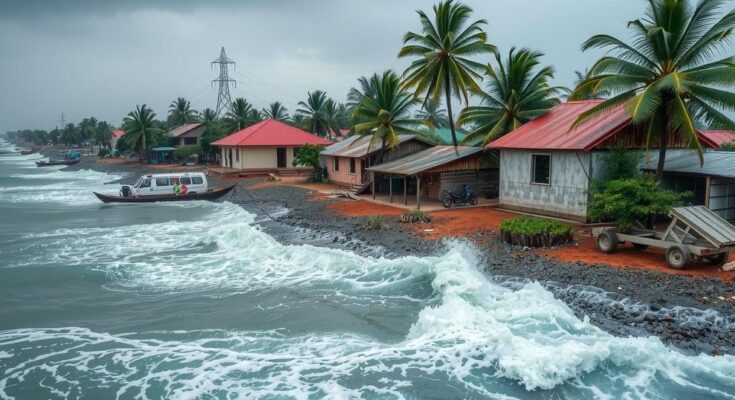Tropical Cyclone Chido has severely impacted Mozambique, affecting approximately 453,971 people and causing extensive damage to homes and infrastructure. Major health crises have emerged, including a cholera outbreak. Urgent humanitarian assistance is needed to address immediate needs such as shelter, food, and medical care. The situation is complicated further by existing challenges from drought and conflict, necessitating increased funding to support recovery efforts and safeguard vulnerable populations.
Tropical Cyclone Chido has wreaked havoc across Mozambique, initiating a critical humanitarian crisis following its landfall on December 15, 2024. With record rainfall of over 250mm in just 24 hours and winds reaching up to 120 km/h, the cyclone has devastated local communities. The National Institute for Natural Disasters (INGD) reports that as of December 24, 2024, approximately 453,971 individuals have been affected, with significant property damage, including the destruction of over 70,000 homes and numerous health facilities and schools.
In specific regions such as Cabo Delgado Province, particularly in Mecufi, Metuge, and Chiure, reports describe near-total destruction, impacting an estimated 272,000 residents. Life-saving infrastructures like health centers have become non-operational, aggravating public health crises, including a cholera outbreak with 302 reported cases and 29 fatalities. The extent of the damage is compounded by ongoing threats from non-State armed groups, forcing internally displaced persons (IDPs) into an even more vulnerable situation.
As humanitarian organizations scramble to respond, urgent needs include temporary shelter, food, clean water, medical supplies, and critical sanitation measures to prevent disease outbreaks. High levels of trauma, gender-based violence (GBV), and psychological distress are rampant, necessitating comprehensive mental health support strategies and GBV prevention measures to safeguard affected individuals. The complexities surrounding the current humanitarian response have been exacerbated by a lack of funding, as the operational landscape is burdened by the simultaneous impacts of drought and conflict affecting over 2.7 million people.
To contend with the catastrophic aftermath of Cyclone Chido, humanitarian partners are coordinating efforts with the Mozambican government and civil society, yet they face significant resource shortages. The window for aid is closing rapidly as communities increasingly face debilitating challenges in rebuilding their lives. Reinforcement of humanitarian pipelines and emergency fund allocations is critical to avert a widespread disaster, as operational capacities continue to stretch thin under the enormity of the need. Restoration of vital services and infrastructure must be prioritized immediately to support recovery in affected areas.
The call for increased funding and mobilization of resources is urgent; without prompt action, the consequences for vulnerable populations could be catastrophic. The situation remains dire, and a coordinated response is paramount to address immediate needs and ensure sustainable recovery amidst ongoing humanitarian crises throughout Mozambique.
The occurrence of Cyclone Chido has compounded the existing humanitarian needs faced by Mozambique, which is grappling with multiple overlapping crises, including the effects of drought, conflict, and disease outbreaks. Affecting millions already, the cyclone’s devastation exacerbates the physical and psychological impacts on communities, many of whom are displaced and living in precarious conditions. Prior to Cyclone Chido, Mozambique’s response capacities were already stressed, leaving communities ill-prepared to handle another substantial disaster. The emphasis on a multi-agency coordinated response is vital as the situation continues to deteriorate.
In summary, the destruction caused by Tropical Cyclone Chido has led to an urgent and unprecedented humanitarian crisis across Mozambique. Immediate and sustained assistance is critical to address the vast needs of affected populations, safeguard against further health emergencies, and support recovery efforts. The need for increased funding and resource mobilization is urgent, as humanitarian partners work diligently to meet the overwhelming demands posed by this disaster. Effective intervention must also prioritize the ongoing vulnerabilities exacerbated by previous conflicts and natural disasters to foster a more resilient recovery.
Original Source: www.unocha.org




